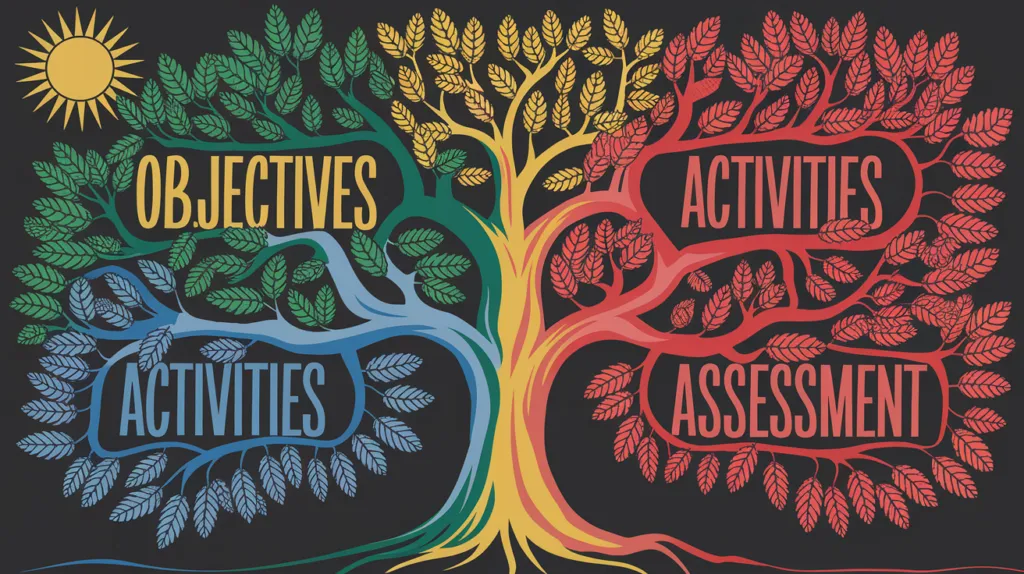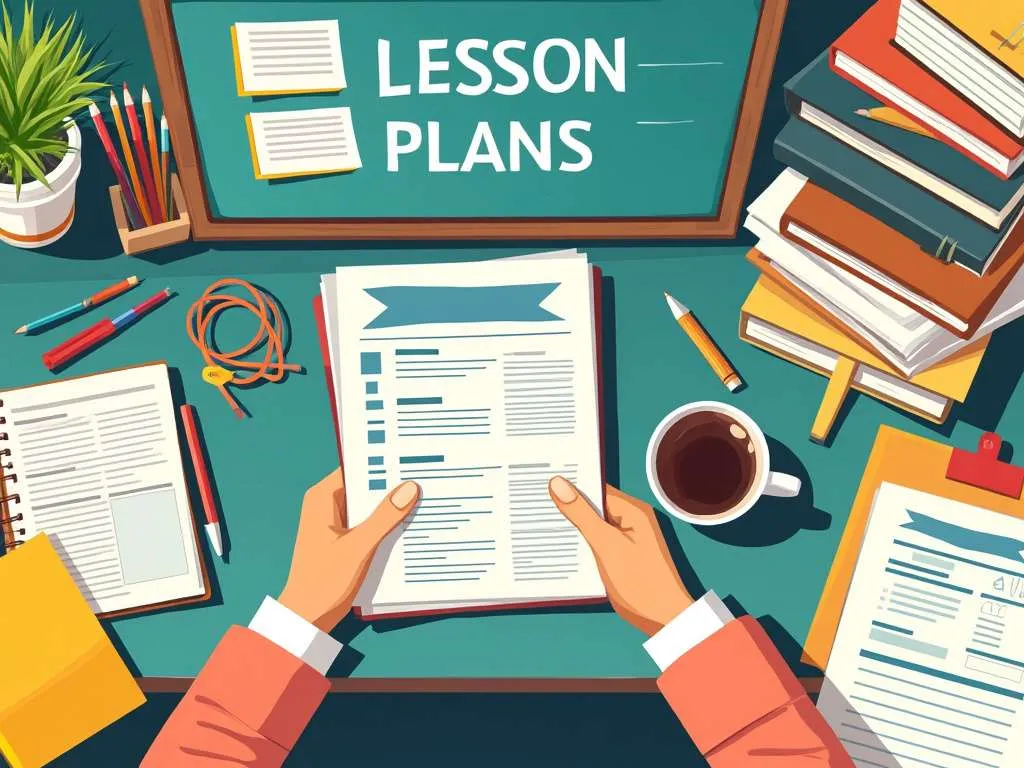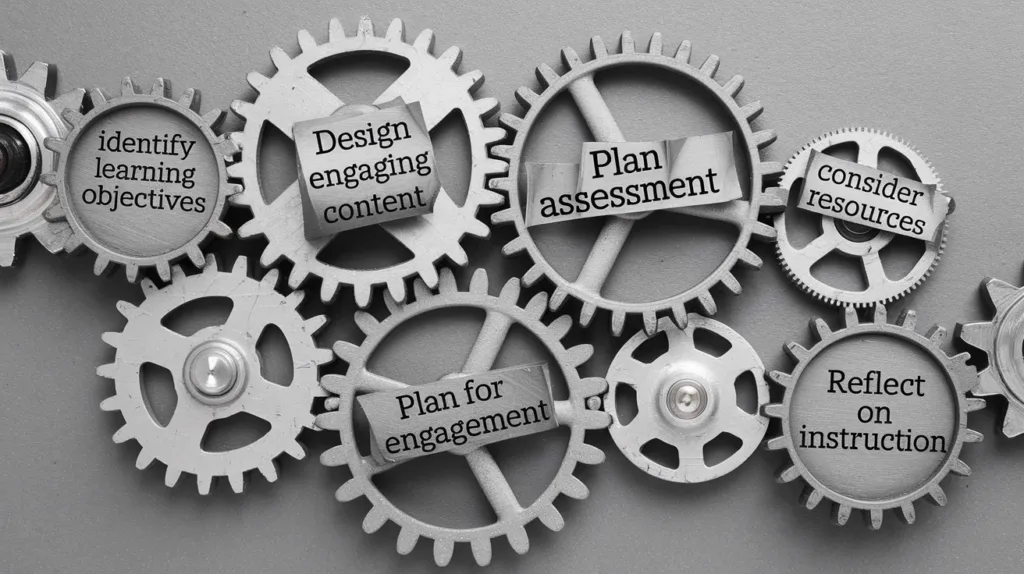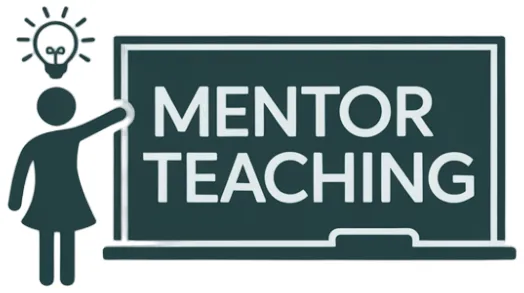As a teacher, you know that walking into a classroom without a plan is like trying to navigate a ship without a map. That’s where lesson planning comes in. It’s an essential skill that can make or break your teaching experience and students’ learning outcomes.

In this guide, we’ll explore lesson planning, its meaning, its cruciality, and how you can master this vital educational tool. Whether you’re a seasoned educator or just starting your teaching journey, this article will provide valuable insights to enhance your lesson-planning skills.
What is a Lesson Plan?

Lesson Plan Definition
At its core, a lesson plan is a teacher’s detailed description of the course of instruction for a class. Think of it as a roadmap for a single class period, outlining what students will learn and how it will be taught. It’s your game plan, your blueprint for success in the classroom.
Key Components of a Lesson Plan
A well-crafted lesson plan typically includes:
- Learning objectives: What do you want your students to know or be able to do by the end of class?
- Materials and resources: What tools, textbooks, or technology will you need?
- Instructional strategies: How will you present the information? Through lecture, discussion, group work, or hands-on activities?
- Assessment methods should be designed to evaluate how well students are meeting the lesson objectives.: How will you check if students have understood the material?
- Time management: How will you allocate time for each part of the lesson?
Importance of Lesson Planning in Education
Lesson planning is more than just a bureaucratic requirement. It’s a powerful tool that can:
- Ensure you cover all necessary content
- Help you stay organized and focused during class
- Provide a sense of direction and purpose for both you and your students
- Allow for better time management
- Facilitate differentiation to meet diverse student needs
The Role of Lesson Planning in Education

Benefits of Effective Lesson Planning
When you invest time in creating solid lesson plans, you’re setting yourself and your students up for success. Here’s how:
- Increased confidence: Walking into class with a well-thought-out plan boosts your confidence as a teacher.
- Improved time management: You’re less likely to run out of material or rush through important concepts.
- Better student engagement: Planned activities and smooth transitions keep students focused and interested.
- Enhanced learning outcomesWhen lessons are structured and purposeful, students need to learn more effectively and are more likely to achieve the lesson objectives.

Impact on Student Learning Outcomes
Effective lesson planning directly influences student achievement. When lessons are well-planned:
- Students understand the purpose of each activity
- Learning builds logically from one concept to the next
- There’s a balance between instruction and practice
- Students receive timely feedback and assessment
Enhancing Teacher Effectiveness
Lesson planning isn’t just about what happens in the classroom; it’s also a tool for professional growth. As you plan, you:
- Reflect on your teaching methods
- Identify areas for improvement
- Become more intentional about your instructional choices
- Develop a repertoire of effective teaching strategies
Essential Elements of a Lesson Plan
Now that we understand the importance of lesson planning, let’s break down its key components:

Learning Objectives
Learning objectives are the foundation of your lesson plan. They answer the question: “What should students know or be able to do by the end of this lesson?” Effective learning objectives are:
- Specific
- Measurable
- Achievable
- Relevant
- Time-bound (SMART)
For example, instead of a vague objective like “Students will learn about fractions,” you might write: “By the end of the lesson, students will be able to add fractions with like denominators.”
Materials and Resources
List everything you’ll need to teach the lesson effectively. This might include:
- Textbooks or worksheets
- Technology (computers, tablets, interactive whiteboards)
- Manipulatives or props
- Art supplies
- Any other specific materials for activities or demonstrations

Being prepared with all necessary materials ensures smooth lesson delivery and minimizes disruptions during learning activities.
Instructional Strategies
This section outlines how you’ll present the information and engage students in learning. Consider a mix of strategies to cater to different learning styles:
- Direct instruction (lecturing)
- Guided practice
- Independent work
- Group discussions or projects
- Hands-on activities or experiments
- Technology-based learning
Remember, variety is key to keeping students engaged and addressing diverse learning needs.
Assessment Methods
How will you know if students have met the learning objectives? Include both formal and informal assessment methods:
- Quizzes or tests
- Exit tickets
- Observation of student work
- Class discussions
- Projects or presentations
- Homework assignments
Assessments should align with your learning objectives and instructional strategies.
Time Management
Break down your lesson into timed segments. A typical structure might look like this:
- 5 minutes: Warm-up or review
- 15 minutes: Introduction of new material
- 20 minutes: Guided practice
- 10 minutes: Independent practice
- 5 minutes: Wrap-up and assessment
Be realistic with your timing, and always plan for a little flexibility to address unexpected questions or challenges.
By focusing on these essential elements, you’ll create lesson plans that are structured, purposeful, and effective. Remember, the goal is not perfection, but continuous improvement in your planning and teaching skills.
Steps of Lesson Plan Creation

Creating an effective lesson plan doesn’t have to be daunting. Follow these steps to craft a plan that works for you and your students:
Identifying Learning Goals
Start by asking yourself: “What do I want my students to achieve?” Your goals should be:
- Aligned with curriculum standards
- Appropriate for your students’ level
- Clearly defined and measurable
For instance, “Students will understand the water cycle” becomes “Students will be able to diagram and explain each stage of the water cycle.”
Determining Prior Knowledge
Before introducing new material, consider how it aligns with the lesson objectives and the students need to learn.
- What do your students already know about the topic?
- Are there any common misconceptions you need to address?
- How can you build on their existing knowledge?
This step helps you tailor your instruction and avoid covering material that’s too basic or too advanced.
Selecting Appropriate Activities
Choose activities that:
- Directly support your learning goals
- Engage students actively in the learning process
- Cater to different learning styles (visual, auditory, kinesthetic)
Remember, variety is key. Mix up individual work, group activities, and whole-class discussions to keep students engaged.
Developing Assessment Strategies
Plan how you’ll check for understanding throughout the lesson:
- Formative assessments (e.g., quick quizzes, thumbs up/down)
- Summative assessments (e.g., end-of-unit tests, projects)
- Informal checks (e.g., observing student work, listening to discussions)
Ensure your assessments align with your learning goals and provide meaningful feedback.
Creating a Timeline
Map out how you’ll use your class time:
- Allocate time for each activity
- Plan transitions between activities
- Include time for questions and clarification
- Build in buffer time for unexpected situations
Be realistic – planning less and doing it well is better than rushing through too much material.
Planning for Differentiation
Consider how you’ll address diverse learning needs:
- Prepare additional challenges for advanced learners
- Plan support strategies for struggling students
- Think about accommodations for students with special needs
Differentiation ensures that all students can access the learning, regardless of their starting point.
Types of Lesson Plans

Different teaching situations call for different types of lesson plans. Here are some common varieties:
Daily Lesson Plans
These are your bread and butter – detailed plans for individual class periods. They typically include:
- Specific learning objectives for the day
- A step-by-step outline of activities
- Materials needed
- Assessment strategies
Daily plans help you stay focused and ensure you’re making steady progress towards larger unit goals.
Unit Plans
Unit plans cover a series of related lessons over several days or weeks. They include:
- Overarching unit goals
- A sequence of daily lessons
- Major assignments or projects
- Culminating assessments
Unit plans help you see the big picture and ensure coherence across multiple lessons.
Long-term Curriculum Plans
These plans outline your teaching goals for a semester or full school year. They typically:
- Align with state or national standards
- Map out major units and their sequence
- Identify key skills and knowledge to be developed
- Plan for major assessments and projects
Long-term plans help you pace your instruction and ensure you cover all necessary material.
Emergency or Substitute Teacher Plans
These are simplified plans you prepare in advance for unexpected absences. They should:
- Be self-explanatory and easy to follow
- Include all necessary materials and resources
- Provide meaningful activities that reinforce previous learning
- Include clear instructions for classroom management
Having emergency plans ready ensures learning continues even when you can’t be there.
Student Teacher Lesson Plans
For student teachers, lesson planning is a crucial skill to master. Here are some specific considerations:
Unique Considerations for Student Teachers
As a student teacher, you’re learning to balance theory with practice. Your lesson plans should:
- Demonstrate your understanding of pedagogical principles
- Show creativity and innovation in your teaching approaches to adjust your lesson plan effectively.
- Be detailed enough for your mentor teacher to evaluate
Remember, your lesson plans are not just teaching tools, but also learning documents for your development.
Guidance from Mentor Teachers
Take advantage of your mentor teacher’s experience:
- Ask for feedback on your plans before and after teaching
- Observe how they plan and adapt their lessons
- Discuss the reasoning behind their planning choices
Your mentor is a valuable resource – don’t hesitate to ask questions and seek advice.
Balancing Creativity and Structure
While it’s important to follow your school’s lesson plan format, don’t be afraid to inject your own style:
- Experiment with different teaching strategies
- Incorporate your unique interests or skills
- Try out innovative activities or technologies
The key is to balance creativity with the need for clear, structured learning experiences.
Common Challenges and Solutions
Student teachers often face challenges like:
- Overplanning: Solution: Focus on quality over quantity. It’s okay if you don’t complete everything.
- Underestimating time: Solution – Always plan a little extra. Adding an extension activity is easier than filling unexpected free time.
- Lack of confidence: Solution – Even experienced teachers were once beginners. Be kind to yourself and learn from each experience.
By addressing these challenges head-on, you’ll grow more confident in your planning and teaching skills.
Teachers’ Learning Plan
As educators, our own learning journey never stops. Here’s how to incorporate continuous improvement into your teaching practice:
Continuous Professional Development
Stay current with educational trends and best practices:
- Attend workshops and conferences
- Participate in webinars or online courses
- Join professional learning communities
- Read educational journals and books
Remember, investing in your own learning directly benefits your students.
Incorporating New Teaching Methodologies
Education is an evolving field. Be open to trying new approaches:
- Experiment with project-based learning
- Explore flipped classroom techniques
- Implement inquiry-based instruction
- Try out gamification strategies
Reflect on how these new methods impact student engagement and learning outcomes.
Adapting Lesson Plans Based on Experience
Use your classroom experiences to refine your planning:
- Note which activities were most effective
- Identify areas where students struggled
- Adjust pacing based on actual class time needed
- Incorporate successful impromptu moments into future plans
Each lesson is an opportunity to learn and improve for next time.
Collaborative Planning with Colleagues
Don’t plan in isolation. Collaborate with your peers:
- Share lesson ideas and resources
- Co-plan units or cross-curricular projects
- Observe each other’s classes and provide feedback
- Discuss strategies for challenging topics or student needs
Collaboration can spark creativity and lighten the planning workload.
Best Practices for Effective Lesson Planning

Enhance your lesson planning with these tried-and-true strategies:
Aligning with Curriculum Standards
Ensure your lessons meet required standards:
- Reference curriculum documents when setting objectives
- Map out how each lesson contributes to broader learning goals
- Use standards-aligned resources and assessments
This alignment ensures your teaching contributes to students’ long-term academic success.
Incorporating Diverse Learning Styles
Plan activities that cater to different learners:
- Visual learners: Use diagrams, charts, and videos
- Auditory learners: Include discussions, lectures, and music
- Kinesthetic learners: Incorporate hands-on activities and movement
Variety in your lessons helps engage all students and reinforces learning through multiple modalities.
Flexibility and Adaptability
Build flexibility into your plans:
- Have extension activities ready for early finishers
- Prepare simplified versions of tasks for struggling students
- Be ready to adjust your pace based on student understanding
Remember, your plan is a guide, not a script. Be prepared to adapt as needed.
Reflection and Revision
After each lesson, take time to reflect:
- What went well?
- What could be improved?
- Were the learning objectives met?
- How engaged were the students?
Use these reflections to continually refine and improve your lesson plans.
Technology in Lesson Planning
Embrace digital tools to enhance your planning and teaching:
Digital Tools for Lesson Plan Creation
Explore apps and websites designed for educators:
- Planboard: For creating and organizing lesson plans
- Common Curriculum: Offers collaborative planning features
- Chalk: Helps align lessons with standards
These tools can streamline your planning process and keep your resources organized.
Integrating Technology into Lessons
Incorporate digital resources to engage students:
- Use interactive whiteboards for collaborative activities
- Implement educational apps for practice and assessment
- Create multimedia presentations to illustrate complex concepts
- Utilize virtual field trips to expand learning beyond the classroom
Remember, technology should enhance, not replace, good teaching practices.
Online Resources for Lesson Plan Ideas
Take advantage of the wealth of resources available online:
- Teachers Pay Teachers: For ready-made lesson plans and activities
- Khan Academy: For instructional videos and practice exercises
- PBS Learning Media: For educational videos and interactive content
- Edutopia: For articles on innovative teaching strategies
While these resources are valuable, always adapt them to fit your specific students’ needs.
Common Pitfalls in Lesson Planning and How to Avoid Them

Even experienced teachers can fall into planning traps. Here are some common pitfalls and strategies to avoid them:
Overplanning or Underplanning
Pitfall: Trying to cram too much into a lesson or not planning enough activities.
Solution:
- Be realistic about timing
- Plan one or two extension activities
- Practice the “must do, should do, could do” approach
Remember, it’s better to thoroughly cover less material than to rush through too much.
Neglecting Differentiation
Pitfall: Planning a one-size-fits-all lesson that doesn’t address diverse learning needs.
Solution:
- Plan tiered activities for different ability levels
- Prepare scaffolding for struggling students
- Have challenge tasks ready for advanced learners
Differentiation ensures all students can access and benefit from the lesson.
Failing to Consider Time Constraints
Pitfall: Not accounting for transitions, interruptions, or unexpected questions.
Solution:
- Build in buffer time between activities
- Plan shorter activities that can be extended if time allows
- Have a flexible mindset – be ready to adjust on the fly
Realistic timing leads to smoother lesson delivery and less stress for you and your students.
Ignoring Assessment Opportunities
Pitfall: Focusing solely on instruction without checking for understanding.
Solution:
- Incorporate frequent formative assessments
- Plan varied assessment methods (e.g., quizzes, discussions, exit tickets)
- Use assessment data to inform future lessons
Regular assessment helps you and your students gauge progress and identify areas for improvement.
Lesson Plan Templates and Examples
Having a solid template can streamline your planning process. Here are some options to consider:
Basic Lesson Plan Template
A simple template might include:
- Lesson Title
- Learning Objectives
- Materials Needed
- Introduction/Warm-up (5-10 minutes)
- Main Activity (20-30 minutes)
- Practice/Application (10-15 minutes)
- Assessment/Closure (5-10 minutes)
- Extensions/Homework
Adapt this template to fit your teaching style and subject area.
Subject-Specific Templates
Different subjects may require specialized templates:
- Math: Include space for problem-solving strategies and practice exercises
- Science: Add sections for hypotheses, experiments, and safety considerations
- Language Arts: Include areas for vocabulary, reading strategies, and writing prompts
- Social Studies: Add spaces for primary sources and discussion questions
Tailor your template to highlight the key components of your subject area.
Customizing Templates for Individual Needs
Remember, templates are starting points. Customize them to fit your needs:
- Add a section for differentiation strategies
- Include a reflection area for post-lesson notes
- Create a digital version that links to online resources
The best template is one that works for you and your students.
Evaluating and Improving Lesson Plans
Continuous improvement is key to effective teaching. Here’s how to evaluate and enhance your lesson plans:
Self-Assessment Techniques
Regularly reflect on your lessons:
- Keep a teaching journal to record observations
- Use a checklist to ensure you’ve included all essential elements
- Video record your lessons occasionally for self-review
Honest self-assessment is the first step to improvement.
Peer Review and Feedback
Collaborate with colleagues:
- Exchange lesson plans for review
- Invite peers to observe your lessons
- Participate in professional learning communities
Fresh perspectives can offer valuable insights and new ideas.
Student Input and Reactions
Don’t forget to involve your students:
- Ask for feedback on activities and pacing
- Observe student engagement levels
- Use exit tickets to gauge understanding and enjoyment
Your students’ experiences are a crucial measure of lesson effectiveness.
Iterative Improvement Process
Use a cycle of continuous improvement:
- Plan the lesson
- Teach the lesson
- Assess the outcomes
- Reflect on the results
- Make adjustments
- Repeat the process
Each iteration of this cycle can lead to more effective, engaging lessons.
Conclusion
Lesson planning is both an art and a science. It requires creativity, knowledge of your subject and students, and organizing and prioritizing information. While it may seem daunting initially, remember that every lesson plan is an opportunity to improve your craft.
Key takeaways:
- Start with clear, measurable objectives
- Plan for diverse learning needs
- Be flexible and ready to adapt
- Reflect on and learn from each lesson
- Collaborate with colleagues and seek feedback
- Continuously update your skills and knowledge
By investing time and effort into your lesson planning, you’re not just preparing for a single class – you’re developing a skill that will benefit you and your students throughout your teaching career. Remember, the goal isn’t perfection, but continuous growth and improvement.
As you continue your journey as an educator, let your lesson plans be living documents that evolve with your experience and your students’ needs. Happy planning, and here’s to many engaging, effective lessons ahead!




